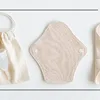Why these friends decided to launch a sustainable menstrual hygiene startup
Kolkata-based startup FabPad manufactures eco-friendly, affordable, and reusable alternatives to feminine hygiene products, while providing employment to underprivileged women.
‘That time of the month’ often has a negative connotation, but the deluge of eco-friendly and organic feminine hygiene products on the market are giving a positive spin to it. How you ask? By being kind to planet Earth and to women’s bodies alike.
Kolkata-based brand , founded in August 2020 by Shripriya Khaitan Dhelia and Upasana Todi Prakash, is a good example of this.
“Seventy percent of girls drop out of school when they start menstruating. Approximately 3.3 million tons of plastic waste are disposed in India every year and around 113,000 tons of this waste comprise single use plastic sanitary napkins. These are not just statistics. This is a reality that needs more solutions than one.
“Though we knew that this is a fairly crowded space, we had two main objectives when we started FabPad. To do our bit to save the environment and to address period poverty in India. We wanted to offer the basic privilege of wellness, self-care, and hygiene to women everywhere,” says Shripriya in a chat with YS Weekender.
The background
A graduate of London College of Fashion, Shripriya is a fashion designer who brings design aesthetics on board. Upasana Todi Prakash has a BBA from the University of Cincinnati, Ohio, and MBA from the Indian School of Business, Hyderabad, and brings the business sense to their joint venture.
In August last year, the two friends turned business partners when they connected over their vision of creating a sustainable menstruation brand in India.
FabPad manufactures eco-friendly, affordable, healthy, and reusable alternatives to feminine hygiene products.
Pointing to statistics, Shripriya says that though climate change is a relevant and much-touted topic these days, very few are concerned about global waste.
According to the latest World Bank report titled, ‘What a Waste 2.0: A Global Snapshot of Solid Waste Management to 2050’, global annual waste generation is expected to reach 3.4 billion tonnes over the next 30 years. Unfortunately, period paraphernalia is one of the major contributors to global waste, due to a lack of awareness of sustainable menstruation habits.
“At FabPad, we aim to impact the environment, along with creating an impact on women around us. We are working towards empowering women from low-income communities. Through our ‘Project Padma’, we partner with women from disadvantaged backgrounds to stitch and sell cloth pads. For every 25 pads sold, FabPad donates one pad to economically disadvantaged girls.
“We also partner with like-minded NGOs to organise workshops on menstrual health with a goal to encourage open conversations around menstruation through awareness and education. Through Project Padma, FabPad has till date distributed 5,000 sanitary pads and empowered over 5,000 women,” Shripriya says.
She highlights that switching to reusable sanitary items is an individual choice for most women. Some women may not be very comfortable with using a product like a menstrual cup whereas some may not have opted for it because of the lack of information on it.

FabPad wants to give women a convenient and eco-friendly alternative to choose sustainable menstruation,
The products
Some of the products available are reusable cloth pads, reusable cloth pantyliners, menstrual cups, period panties, reusable cloth diapers for babies, and organic cotton disposable sanitary napkins (the most recent launch). The brand plans to expand its offering by continuing to add sustainable products to its line-up.
“Since our brand carries something for everyone and has gained traction as a one-stop solution for sustainable personal hygiene and menstrual management, our target audience is quite large - from economically disadvantaged women in rural areas to Generation Z!” Shripriya says.
Currently, FabPad functions as a D2C brand with a focus on ecommerce platforms. The products are available on its website as well as on other ecommerce platforms such as Amazon, Flipkart, Nykaa, Meesho, Jio Mart, and Big Basket. Prices of the products start from Rs 199 for a single reusable pad and go up to Rs 599 for a pack of four pads, reusable baby diapers, and period panties.
Their core team consists of seven members with a total of 70 members, including the manufacturing personnel. The brand name is the brainchild of Shripriya and signifies ‘fabulous pads made of fabric’.
Their marketing team strategy focuses on media channels, campaigns, and a variety of avenues like paid ads, native ads, social media marketing, video marketing, SEO, and search engine marketing, among others.

FabPad offers a range of menstrual hygiene products, including menstrual cups, reusable cloth pads, reusable cloth pantyliners, period panties, and organic cotton disposable sanitary napkins.
The growth story
According to alliedmarketresearch.com, the feminine hygiene products market is expected to garner $42.7 billion by 2022, registering a CAGR of 6.1 percent during the period of 2016-2022. The report notes that one of the top factors impacting this market is the increasing demand for organic and biodegradable raw material-based products.
FabPad began with an initial investment of Rs 25 lakh from co-founders Shripriya and Upasana in a 90:10 ratio respectively. In just over a year, the brand has added a number of sustainable products to its line and has clocked revenue growth of 10-15 percent month on month.
When asked about the competition, Shripriya says, “At FabPad we strongly follow the mantra ‘Who does it better?’. The space might be crowded but there is room for everyone. Standalone sustainable menstruation brands like Ecofemme as well as product specific (baby diaper) companies are among our competitors.”
However, she believes there is a differentiator.
“We are different because of our two main goals - environmental impact and social impact. Through our products, we want to give a convenient and eco-friendly alternative for women to choose sustainable menstruation, and through our business we want to empower women around us. Hence, brand FabPad is by women, for women,” she says.
“Our super women called Padmas (named after their Project Padma), are an integral part of our organisation. They help us stitch the FabPad products, sell and distribute the products, spread awareness about safe menstrual practices, and reduce the taboo surrounding the subject.”
Since all their products are manufactured in-house, they lay great emphasis on quality. Products remain affordable by eliminating all middlemen from the process. “From the choice of fabric to the method of manufacturing our products, there are many ways in which FabPad is different from competitors,” Shripriya says.
Well-placed to be a leader in the feminine hygiene and personal care segment, FabPad is looking to cement its presence around the country further.
Several more products such as sustainable breast pads, reusable makeup removers, intimate washes, toilet seat sanitisers, tampons, and eventually cosmetic and beauty products, are being researched for development.
“We have already empowered approximately 37,500 menstruators with better health and hygiene, and would like to grow this number by 10x in the next two years,” Shripriya says.
Edited by Teja Lele










